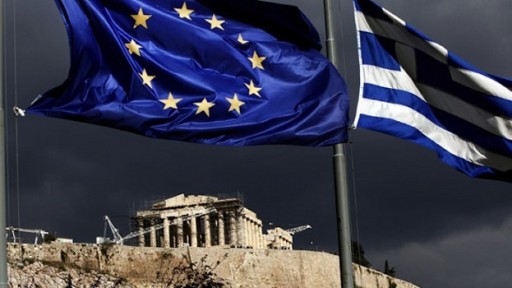- Home
- >
- >
- All Greek to me: What could happen in weekend vote

All Greek to me: What could happen in weekend vote

Greeks will be heading to the polls this weekend to elect a new government.
The Greek parliament has 300 seats – that's the easy bit. Under Greece's electoral law, the party with the most votes automatically gets 50 seats. The other 250 seats are handed out according to the share of the vote – so the leading party can still get more seats. Only political parties that have got at least 3 percent of the overall vote can get a seat in the parliament.
1) Outright majority for Syriza
The left-wing opposition party Syriza might gain outright majority – but even the current polls don't point to this. Syriza will have to get 42 percent of the vote to form a government on its own. But if Greece's smaller parties fail to capture the 3 percent of the vote to qualify for parliament, that percentage could go down to 34 percent. But such a share of the vote, though, would be very fragile and could lead to new elections soon.
2) Coalition with SYRIZA leading the government
This seems to be the most likely scenario and would also give Syriza some breathing space to back down on some of its pre-electoral promises. Syriza has risen in popularity thanks to its anti-bailout rhetoric -- which it might not be able to commit to when push comes to shove. A coalition could provide Syriza with a convenient excuse that it can't follow through with all its promises. Even though the European Union's contributions to Greece's 240 billion euros bailout is coming to an end, the country will still need a precautionary credit line. In addition, if Greece wants to benefit from the forecast European Central bank quantitative easing program, it will still have to stick to spending controls.
If the first party doesn't achieve an outright majority, it is given a mandate to start talks with other parties to form a government.
3) Coalition with New Democracy leading the government
According to the latest polls, Samaras' New Democracy is highly unlikely to form a government on its own. As it's heading for second place in the polls, the only way it can get into power is if the most popular party – in this case Syriza – fails to secure a coalition. But New Democracy would still need the support of almost all parties in parliament in order to build its own coalition. This would include the infamous right-wing Golden Dawn party and the Communist party. The latter has said it will not collaborate with anyone, while no one would dare to ally with the Golden Dawn, a party whose leaders have been indicted for criminal acts.
According to Greek electoral law, if the second party doesn't manage to form a government, the mandate goes to the third party, which in this case might be Golden Dawn, and if that fails, too, the President will try to form a temporary caretaker government to prepare for new elections.
4) New elections in March
If all parties and the President fail to form a coalition, then new elections are announced. The Supreme Court appoints a temporary government and the country goes into campaigning season again that lasts for thirty days. This scenario will extend the period of political instability and market volatility. Greek stocks already lost more than 20 percent last year, when elections were announced, while yields have soared. The "Troika" of international organizations responsible for making sure Greece sticks to the rules of its bailout has said talks on the next payout will only start once there is a new government in place. "If the first party comes close to an outright majority, there is fear that some will be tempted to fail to form a coalition on purpose in the hope of making it in the next election. This will be bad for the country", said Mandravelis on the phone.
 Varchev Traders
Varchev Traders If you think, we can improve that section,
please comment. Your oppinion is imortant for us.






